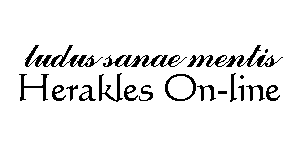Please visit my Ancient History page at

Special feature: Who Was Hercules?
- Glory of Zeus
- Hercules
- Herakles
- Of Gods & Men (including the 12 Labours)
- Typhon & Hydra
- Herakles and the 12 labors
- The Labours of Herakles
- The Stymphalian Birds
- labors of Heracles
- Heracles and Cerberus
- Metopes of labors of Heracles
- The Labors of Hercules from Greek Mythology
|
LABORS
PLATO [484b] Gorgias
And it seems to me that Pindar adds his evidence to what I say, in
the ode where he says--
Law the sovereign of all,
Mortals and immortals,
which, so he continues,--
Carries all with highest hand,
Justifying the utmost force: in proof I take
The deeds of Hercules, for unpurchased
--the words are something like that--I do not know
the poem well--but it tells how he drove off the cows
[484c] as neither a purchase nor a gift from Geryones;
taking it as a natural right that cows ar any other
possessions of the inferior and weaker should all
belong to the superior and stronger.
Apollodorus
[2.5.1] When Hercules heard that, he went to Tiryns and did as he was bid by Eurystheus. First,
Eurystheus ordered him to bring the skin of the Nemean lion;
[1] now that was an invulnerable beast
begotten by Typhon. On his way to attack the lion he came to Cleonae
and lodged at the house of a
day-laborer, Molorchus;[2] and when his host would have
offered a victim in sacrifice, Hercules told
him to wait for thirty days, and then,
if he had returned safe from the hunt, to sacrifice to Saviour Zeus,
but if he were dead, to sacrifice to him as to a hero.[3] And having
come to Nemea and tracked the
lion, he first shot an arrow at him, but when he perceived
that the beast was invulnerable, he heaved
up his club and made after him.
And when the lion took refuge in a cave with two mouths, Hercules
built up the one entrance and came in upon the beast through the
other, and putting his arm round its
neck held it tight till he had choked it;
so laying it on his shoulders he carried it
to Cleonae. And finding
Molorchus on the last of the thirty days about to sacrifice
the victim to him as to a dead man, he
sacrificed to Saviour Zeus and brought the lion to Mycenae.
Amazed at his manhood, Eurystheus
forbade him thenceforth to enter the city, but ordered
him to exhibit the fruits of his labours before the
gates. They say, too, that in his fear he had a
bronze jar made for himself to hide in under the earth,[4]
and that he sent his commands for the labours
through a herald, Copreus,[5] son of Pelops the Elean.
This Copreus had killed Iphitus and fled to Mycenae,
where he was purified by Eurystheus and took up his abode.
|
Suggestions, questions, comments to:
eudaimonos@thepentagon.com
© 1997 N.S. Gill
|



